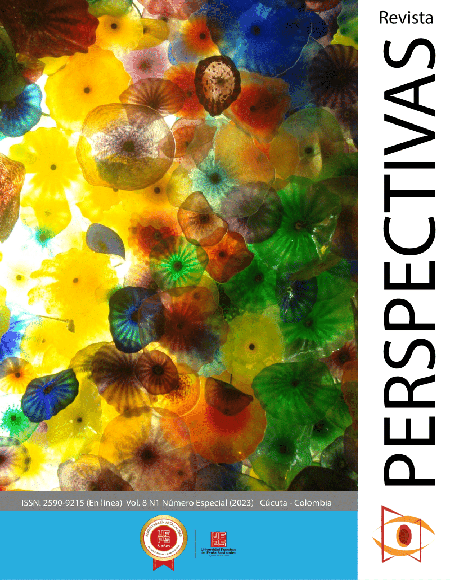The instrumentalization of identity in the Lebanese Conflict
La instrumentalización de la identidad en el conflicto Libanés
Main Article Content
This research tries to shed light on the case of Lebanese conflict, an example of identitarian conflict that has been alive for centuries, and given its location in the Middle East, an area of international interests, the country has been exposed to many external interventions. Said interventions have taken advantage of the political inexperience of local communities to sow division as part of a master plan to redesign the area according to occidental interests. The objective is to rethink a Peace Process based on the urgent need for a change of mentality among the human mosaic that integrates and defines Lebanese society. For this purpose, a qualitative methodology was used, through an analytical study of works by major authors who masterfully deal with the theme of identity and multiculturalism as well as an inclusive humanism, where people resemble rather than differ by sharing common basic values. As a result, it is observed that the identity of the Lebanese people has been instrumentalized to guarantee the sustainability of the local conflict, dissecting it into small characteristics such as confession. It concludes with a peace process based on a change of mentality on the perception of identity and specifically religious characteristic, in order to move forward with a better inclusive identity.
Downloads
Article Details
Abboud, S. (2009). THE SEIGE OF NAHR AL-BARED AND THE PALESTINIAN REFUGEES IN LEBANON. Arab Studies Quarterly, 31(1/2), 31–48. http://www.jstor.org/stable/41858573
De Lucas, J. (2004). Identidad y Constitución europea ¿es la identidad cultural europea la clave del proyecto europeo? Revista de Pensamiento Contemporáneo. https://doi.org/ISSN 1575-2259
Hajjar, S. G. (2009). The Convoluted and Diminished Lebanese Democracy. Democracy and Security, 5(03). https://doi.org/10.1080/17419160903304864 DOI: https://doi.org/10.1080/17419160903304864
Hamzeh, A. N. (2001). Clientalism, Lebanon: Roots and Trends. Middle Eastern Studies, 37(03). https://doi.org/10.1080/714004405 DOI: https://doi.org/10.1080/714004405
JALLOUL, H. (2008). El Feudalismo Político Del Sistema Confesional Libanés. UNISCI Discussion Papers, (16). https://doi.org/1696-2206
LÓPEZ GARCÍA, B., & FERNÁNDEZ SUZOR, C. (1984). Líbano: Una Federación De Comunidades. Apuntes Para La Historia Política Libanesa. Revista De Estudios PolíTicos. https://doi.org/1984
SORBY, K. R. (2011). Syria and the 1975-76 Civil War in Lebanon. Asian & African Studies, 20 (2). https://doi.org/13351257 Books
CORM, G.; and PETIT, N. (2007). La Cuestión Religiosa En El Siglo XXI: Geopolítica y Crisis De La Posmodernidad. Madrid: Taurus
Corm, G., & MARCÉN, J. M. (2006). El Líbano Contemporáneo: Historia y Sociedad. Barcelona: Bellaterra
Corm, G. (2003). Le Proche-Orient Éclaté, 1956-2003 (3rd ed.). Paris: Gallimard
García, A. M (2008). El Libano: La Incrustación De Un Estado-Nación. Vilafranca del Penedès: Erasmus
Gómez García, L. (2009). Diccionario de Islam e islamismo. Madrid: Espasa-Calpe
HABERMAS, J. ; and JIMÉNEZ, M. (1989). Identidades Nacionales y Postnacionales. Madrid: Tecnos
Hakim, C. (2013). The Origins of the Lebanese National Idea: 1840–1920 (1st ed.). University of CaliforniaPress.http://www.jstor.org/stable/10.1525/j.ctt24hs33 DOI: https://doi.org/10.1525/california/9780520273412.001.0001
MAALOUF, A, ; and VILLAVERDE, F. (1999). Identidades Asesinas. Madrid: Alianza
MENÉNDEZ DEL VALLE, E. (1997). Islam y Democracia En El Mundo Que Viene. Madrid: Libros de la Catarata
NUSSBAUM, M.; and SANTOS MOSQUERA, A. (2014). Las Emociones Políticas: ¿Por Qué El Amor Es Importante Para La Justicia? Barcelona [etc.]: Paidós
SÁNCHEZ, P., and RODRÍGUEZ, J. M. (2009). El Conflicto Del Líbano. Universidad Carlos III de Madrid. Instituto de Estudios Internacionales y Europeos Francisco de Vitoria
TUENI, G. (1985). Une Guerre Pour Les Autres. Editions Lattès, Paris. Doctoral Thesis
Arroyo, M. P. (2004). Tiempo, Historia y Violencia Social El Caso Del Líbano. (Tesis doctoral, Universidad Complutense de Madrid). Recuperada de: Tiempo, historia y violencia social el caso del Líbano - Dialnet (unirioja.es)
García Campello, A. (2006). Historias Del Líbano: La Invención De Un Estado. (Tesis Doctoral, Universitat de Barcelona). Recuperada de: Historias del Líbano: la invención de un Estado - Dialnet (unirioja.es)
Gharzeddine, R. (2019). El Líbano: Crónicas de Fuego y una Perspectiva de Paz. (Tesis doctoral, Universitat de Valencia) Recuperada de: El Líbano: crónicas de fuego y una perspectiva de paz - Dialnet (unirioja.es)
De Lucas, J. (2004). Identidad y Constitución europea ¿es la identidad cultural europea la clave del proyecto europeo? Revista de Pensamiento Contemporáneo, (13). https://doi.org/ISSN 1575-2259 Webpage
Barry, M. (2013, April 4). The term “Middle East”. Wordpress. Retrieved August 10, 2023, from https://abagond.wordpress.com/2013/04/04/the-term-middle-east/
Blair, E. (2022, January 23). Lebanons-financial-crisis-how-it-happened. Reuters. Retrieved September 29, 2023, from https://www.reuters.com/markets/rates-bonds/lebanons-financial-crisis-how-it-happened-2022-01-23/
Gharib, B. (2016, March 16). Why is Sham called so "لماذا سميت بلاد الشام بهذا الاسم Limaza Summiat Bilad as-Sham Bi Haza El Ism". Mawdoo3. Retrieved August 10, 2023, from https://mawdoo3.com/%D9%84%D9%85%D8%A7%D8%B0%D8%A7_%D8%B3%D9%85%D9%8A%D8%AA_%D8%A8%D9%84%D8%A7%D8%AF_%D8%A7%D9%84%D8%B4%D8%A7%D9%85_%D8%A8%D9%87%D8%B0%D8%A7_%D8%A7%D9%84%D8%A7%D8%B3%D9%85
Iglesia Católica Maronita. (2019, agosto 23). EcuRed. Retrieved August 10, 2023, from https://www.ecured.cu/index.php?title=Iglesia_Cat%C3%B3lica_Maronita&oldid=3520731
Jalabi, R. (2014, August 11). Who are the Yazidis and why is Isis hunting them? The Guardian. Retrieved August 10, 2023, from https://www.theguardian.com/world/2014/aug/07/who-yazidi-isis-iraq-religion-ethnicity-mountains
KRUSE, C. (2012). Expedition D´Egypt (1798-1801). Les clés du Moyen-Orient. Retrieved September 29, 2023, from http://www.lesclesdumoyenorient.com/Expedition-d-Egypte-1798-1801.html
Kruse, H. (2021, September 15). Beirutshima: Lebanon’s Suffering. MENA Research & Study Centre. Retrieved August 10, 2023, from https://mena-studies.org/beirutshima-lebanons-suffering/
M. P. L. P. (2017, September 28). Refugiados sirios en Líbano: Extrema vulnerabilidad en un país al límite de sus capacidades. Movimientos por la paz. Retrieved August 10, 2023, from http://www.mpdl.org/noticias/oriente-proximo/derechos-humanos/refugiados-sirios-libano-extrema-vulnerabilidad-pais#sthash.cmbOhwaq.EmLUCwad.dpbs
National Geographic. (2012, June 12). Napoleón y El Fracaso De La Conquista De Egipto. (2012). National Geographic Retrieved August 10, 2023, from http://www.nationalgeographic.com.es/historia/grandes-reportajes/napoleon-en-egipto_6235/7#article-text
Rodriguez, N. (2010). Organización Política Simulación Líbano. Word Press. Retrieved September 29, 2023, from Organización Política | Simulación Líbano (wordpress.com)







